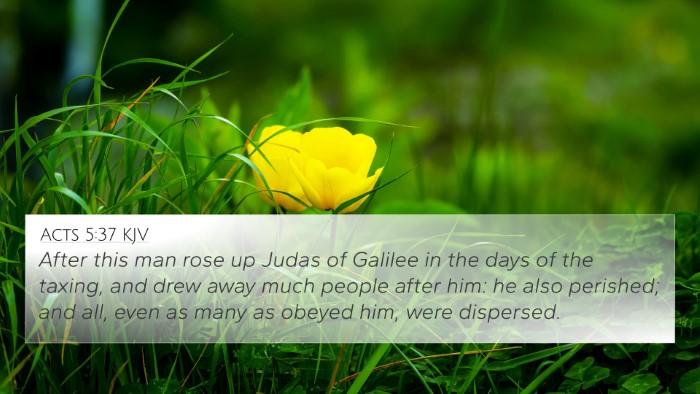Understanding Luke 23:6
Luke 23:6 states: "When Pilate heard of Galilee, he asked whether the man were a Galilean." This verse occurs in the context of the trial of Jesus before Pontius Pilate, highlighting Pilate's inquiry regarding Jesus' origin. Below is a comprehensive interpretation of this verse, synthesizing insights from notable public domain commentaries.
Verse Contextual Analysis
The preceding events in the chapter lead to Pilate's encounter with Jesus. After the Jewish leaders delivered Jesus to Pilate, they accused Him of inciting rebellion and claiming to be the King of the Jews. Pilate's questioning is pivotal; it shows his exploration of jurisdiction and responsibility.
Commentary Insights
-
Matthew Henry's Commentary:
Henry emphasizes Pilate's attempts to extricate himself from the political troubles surrounding Jesus. By learning that Jesus was from Galilee, Pilate seeks to pass the responsibility to Herod, who had jurisdiction over that region. This highlights Pilate's desire to avoid the complexities of the situation.
-
Albert Barnes' Notes:
Barnes notes the significance of Jesus' Galilean origins and how it serves as a means for Pilate to find a way to dismiss the case. This reflects the divided nature of authority and the transference of responsibility among leaders, demonstrating that those in power often seek to evade accountability.
-
Adam Clarke's Commentary:
Clarke provides insight into the political implications of Jesus being a Galilean. He suggests that by trying to determine whether Jesus was a Galilean, Pilate is looking for a reason to defer judgment, aware of the religious tensions and the risks of making a politically charged decision.
Thematic Connections
Luke 23:6 connects with various themes in the Bible, such as authority, accountability, and the quest for justice. It raises questions about the nature of leadership and the burdens carried by those in positions of power. Furthermore, this moment serves as a crucial pivot in the narrative leading to Jesus' crucifixion.
Related Bible Verses
This verse is interconnected with several other scripture passages, providing a broader understanding of its implications:
-
John 18:29: "Pilate then went out to them, and said, 'What accusation do you bring against this Man?'"
This verse parallels the inquiry nature of Pilate as seen in Luke 23:6, emphasizing Pilate's reluctance to engage without certainty of the accusations.
-
Matthew 27:2: "And when they had bound Him, they led Him away and delivered Him to Pontius Pilate the governor."
This establishes the legal proceedings against Jesus, linking to the theme of authority and the trial setting.
-
Luke 23:7: "And as soon as he knew that He belonged to Herod's jurisdiction, he sent Him to Herod."
This verse extends the narrative by showing how Pilate attempted to shift things to Herod, illustrating the lack of commitment to justice.
-
Mark 15:1: "And immediately in the morning the chief priests held a consultation with the elders and scribes and the whole council, and they bound Jesus, led Him away, and delivered Him to Pilate."
Mark's account provides a fuller picture of the conspiratorial efforts leading to Pilate's involvement.
-
Luke 3:1: "Now in the fifteenth year of the reign of Tiberius Caesar, Pontius Pilate being governor of Judea..."
This verse's historical context adds depth to understanding Pilate’s political environment and responsibilities.
-
Acts 4:27: "For truly against Your holy Servant Jesus, whom You anointed, both Herod and Pontius Pilate, with the Gentiles and the people of Israel, were gathered together."
Here, the roles of both Pilate and Herod are revisited, reaffirming their significance in the narrative of Jesus' crucifixion.
-
Isaiah 53:7: "He was oppressed and He was afflicted, yet He opened not His mouth..."
This prophetic scripture connects to Jesus’ demeanor during the trials, allowing reflection on the fulfillment of prophecies regarding the Messiah.
Links to Broader Biblical Themes
This verse isn't only about Pilate's inquiry; it also raises important questions about the fate of Jesus, authority, and the nature of justice within scripture. The overarching narrative of salvation history is touched upon, where Jesus’ interrogation leads toward His ultimate sacrifice.
Tools for Bible Cross-Referencing
For those looking to explore these connections more fully, consider using:
- Bible concordances
- Cross-reference Bible study guides
- Comprehensive Bible reference resources
These tools assist in identifying links between various scriptures, helping readers to glean deeper meanings and thematic connections through cross-referencing.




